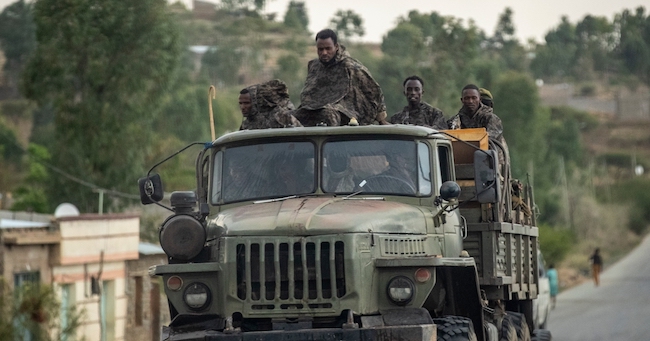
Ethiopian forces have recaptured the strategic towns of Dessie and Kombolcha from Tigrayan fighters, the government said, the latest sign of the government retaking territory it recently lost.
Forces aligned with the Tigray People’s Liberation Front (TPLF) had taken control of the towns, in the Amhara region, just more than a month ago.
“The historic Dessie city and the trade and industry corridor city, Kombolcha have been freed by the joint gallant security forces,” the government communications service said on Twitter, the latest in a round of territorial gains claimed by Prime Minister Abiy Ahmed’s administration.
The state-run Ethiopian Broadcasting Corporation quoted Abiy as saying the rebels had sustained “heavy losses and (were) unable to cope with the strike by allied forces”, AFP news agency reported. “The enemy will be hit and the victory will continue,” he said.
TPLF spokesman Getachew Reda did not immediately respond to a request for comment.
On Wednesday, the government announced that pro-Abiy forces had recaptured the UNESCO World Heritage Site of Lalibela, which had fallen to Tigrayan fighters in August.
In a statement on Sunday, the leader of the TPLF, Debretsion Gebremichael, denied the government was scoring big victories, saying the rebels were making strategic territorial adjustments and remained undefeated.
Martin Plaut, a senior researcher at the University of London, told Al Jazeera the recapture of Dessie and Konbolcha would be “very significant”.
“The Tigrayans have been pushed a long way back. They have been pushed back through towns and villages that they fought extremely hard to take. They must have lost many lives in order to capture them,” he said via Skype from London.
Meanwhile, William Davison, senior analyst on Ethiopia at the International Crisis Group, told Al Jazeera that Ethiopia’s intensified use of drones and the mobilisation of new recruits for the national army had increased pressure on Tigrayan forces.
“This has really hit the Tigrayan supply lines and meant that they had to give up on those offensive ambitions,” he said.
Davison said government forces will try to drive Tigrayan rebels back into Tigray.
“Certainly Tigrayan commanders and leaders had expressed a lot of confidence about their position. So it wouldn’t be a massive surprise if, despite these setbacks, they were able to recover – and unfortunately that would mean this war dragging on for many months,” he added.
The conflict, which erupted in November 2020, took a sharp turnaround at the end of October this year, when the TPLF claimed to have captured Dessie and Kombolcha.
Since then, fears of a rebel march on Addis Ababa have prompted countries such as the United States, France, and the United Kingdom to urge their citizens to leave Ethiopia as soon as possible, although Abiy’s government says TPLF gains are overstated and the city is secure.
The war broke out when Abiy sent troops into the northernmost Tigray region to topple the TPLF government – a move he said came in response to rebel attacks on army camps.
But the rebels mounted a comeback, recapturing most of Tigray by June, including the regional capital Mekelle, before expanding into the neighbouring regions of Amhara and Afar.
The fighting has killed thousands of people, displaced more than two million and driven hundreds of thousands into famine-like conditions, according to United Nations estimates.
Illegal detentions
Earlier on Monday, six countries, including the US, expressed concern over reports of arrests by Ethiopia of Tigrayan citizens based on ethnicity amid the country’s year-old civil conflict, urging the government to immediately “cease” such acts.
The US, Britain, Canada, Australia, Denmark and the Netherlands cited reports by the Ethiopian Human Rights Commission and UK-based rights group Amnesty International on widespread arrests of ethnic Tigrayans, including Orthodox priests, older people and mothers with children.
The countries said in a joint statement they are “profoundly concerned” about the detentions of people without charges, adding that the government’s announcement of a state of emergency last month offered “no justification” for mass detentions.
“Individuals are being arrested and detained without charges or a court hearing and are reportedly being held in inhumane conditions. Many of these acts likely constitute violations of international law and must cease immediately,” the countries said.
They urged Ethiopia’s government to allow unhindered access by international monitors.
“It is clear that there is no military solution to this conflict, and we denounce any and all violence against civilians, past, present and future,” the statement said.
Source: AL JAZEERA AND NEWS AGENCIES























